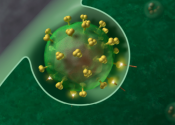Immune cells that create and sustain chronic inflammatory bowel disease identified
In preclinical experiments, Laurie Harrington, Ph.D., and colleagues at the University of Alabama at Birmingham have discovered a subset of immune cells that create and sustain chronic inflammatory bowel disease. These cells ...
Jun 26, 2018
0
0






